每日观察:关注授权项目在Rovio总收益中占比30%(5.8)
1)Rovio首席执行官Mikael Hed日前称公司2011年财报表现乐观,《愤怒的小鸟》系列在这期间的各平台下载量超过6.48亿次,月活跃用户超过2亿(游戏邦注:据AppData 数据显示,《愤怒的小鸟》Facebook版本目前MAU为2340万,DAU达290万)。
Rovio在2011财年总收益为7540万欧元(约合1.063亿美元),税前收入为4800万欧元(约合6760万美元),团队规模已从28人增长至224人。
据其所称,消费品授权项目占公司总收益的30%,公司已有200多家授权合作伙伴 。
2)据TechCrunch报道,谷歌近日宣布Google Play上线两年半以来,其游戏及应用下载量已超过150亿次。据谷歌所称,该平台在5个月内就从100亿次下载量上升至150亿次下载量,游戏是最热门下载产品,在所有下载量中占比超过25%。
截止今年1月份,Android智能手机、平板电脑及其他设备激活量已超过2.5亿部,平均每月激活量达2240万部。
3)EA日前公布的2012财年第四季度财报显示,公司移动业务收益同比上季度增长24%,达到8700万美元,连续三个季度实现收益增长;该业务同比上一财年同期的7000万美元增长24%。
移动业务占EA所有收益的6%,略低于上一季度的7%。基于非GAAP的移动业务收益占该季度EA数字业务收益的20.2%,智能手机收益比上一财年同期增长83%。
EA在2012财年基于非GAAP的移动业务总收益为2.84亿美元,在所有数字业务收益中占比23%。智能手机收益同比上年增长94%,但由于功能性手机业务收益持续下滑,移动业务收益仅比上一财年的2.42亿美元增长17%。智能手机在该时期占基于非GAAP移动业务收益的72%。
《宝石迷阵闪电战》是EA目前盈利性最强的iOS游戏,据AppData数据显示,该游戏目前在iPhone应用营收榜单位居第16名。EA计划在2013财年发布41款新手机、社交及免费增值游戏。
截止3月31日,EA在该季度基于GAAP净收益为4亿美元,预计2013财年基于GAAP的净收益将达40.75亿美元。
4)EA首席执行官John Riccitiello最近在与分析师的电话会议中指出,EA不会投入大笔资金仅购买“一个品牌”或者一个“昙花一现”的项目。
他没有明指Zynga花大价钱收购OMGPOP是个不明智之举,但表示自己对于收购新兴热门游戏及其开发团队一事非常谨慎。在他看来,投入比收购对象收益的10倍甚至20倍价钱收购一家新兴公司非常不妥,支付比其收益多三四倍的价钱才算合适,否则就得确保自己收购的品牌确实经得起时间考验;EA旗下的《模拟人生》、《模拟城市》和《宝石迷阵》就属于这类典型。
5)NPD Group最近数据显示,Android设备在2012年第一季度智能手机销量中占比61%,iOS设备则占比29%,RIM和Windows Phone智能手机则远远落后;该时期智能手机在所有新手机销量中仅占比66%。
尼尔森之前的报告指出,截止2012年3月份,美国智能手机用户比例已超过50%,2011年末的这一数据则是47.8%;在最近激活的智能手机中,Android占比48.5%,超过iOS的32%。
尼尔森的其他调查数据包括:
*在25-34岁年轻用户中,每三个用户中就有两者是智能手机用户;
*亚裔美国人的智能手机普及率最高,有67.3%用户将智能手机作为首选。
6)Epic Games首席执行官Tim Sweeney在最近采访中表示,他认为Android这种开放平台目前基本上处于无序状态,开发商很难针对大量Android设备发售高质量应用,这种缺乏统一的应用认证过程的平台非常不利于项目运营。
Sweeney认为当前的掌机平台应该效仿苹果iOS设备,开发者拥有自由制作游戏的权利,而苹果则负责应用质量审核,iOS对开发者的要求张驰有度,既不苛严也不过于放纵,而今年的Xbox 360和PS 3之类的平台审核过程却甚为苛刻。(本文为游戏邦/gamerboom.com编译,拒绝任何不保留版权的转载,如需转载请联系:游戏邦)
1)Angry Birds merchandising, licensing made up 30% of Rovio’s 2011 revenue
by Mike Rose
Angry Birds creator Rovio Entertainment says it is “very optimistic” about its financial outlook for 2012, having today reported strong revenue and profits for the 2011 fiscal year.
Mikael Hed, Rovio CEO, put the notable results down to the popularity of the Angry Birds brand, although he noted that the company needs to “stay focused on entertaining our millions of fans by continuously developing new and innovative products and services” if it wishes to continue this success.
Hed commented that by the end of the last fiscal year, the Angry Birds franchise had seen over 648 million downloads across all versions and platforms, and more than 200 million active monthly users.
During the 2011 fiscal year, Rovio recorded total revenues of 75.4 million euros ($106.3 million) and earnings before tax of 48.0 million euros ($67.6 million). The company’s employee count grew from 28 to 224 staffers.
Hed said that its consumer products business, which includes its merchandising and licensing outfits, generated revenues that represent 30 percent of the total revenue, thanks to Rovio’s links with over 200 licensing partners.
“The heavy investments made in 2011 to all business areas will be seen in future products,” said Hed.(source:gamasutra)
2)Android’s Google Play reaches 15B game and app downloads
by Eric Caoili
Android device owners have downloaded more than 15 billion games and applications from Google Play (formerly Android Market) two and a half years after the service’s launch.
Google told TechCrunch that it hit this milestone just a few weeks ago, which means the platform jumped from 10 billion downloads to 15 billion in less than five months. The company previously said games are the most popular downloads from the service, making up more than a quarter of all downloads.
Google Play is still behind Apple’s App Store, though, which is nearing 30 billion app and game downloads, but the fast-growing rate of Android activations could help the platform catch up. As of last January, over 250 million Android smartphones, tablets, and other devices had been activated — and 22.4 million are activated each month.(source:gamasutra)
3)Electronic Arts’ mobile revenue climbs again, up to $87M in Q4
Kathleen De Vere
Electronic Arts mobile revenues climbed 24 percent quarter-over-quarter to $87 million in Q4 2012. It was the third straight quarter in a row the company’s mobile revenues increased.
Year-on-year, mobile revenues were also up 24 percent from $70 million in Q4 2011.
Overall mobile revenues made up six percent of EA’s total earnings, a slight decrease from seven percent in Q3 2012. According to EA’s non-GAAP (generally accepted accounting principles) earnings, mobile revenues accounted for 20.2 percent of EA’s total digital revenue for the quarter. Smartphone revenue increased by 83 percent year-on-year in the fourth quarter.
Non-GAAP mobile revenues totaled $284 million for EA’s 2012 fiscal year, accounting for 23 percent of all digital revenue. Although smartphone revenues were up 94 percent year-on-year, EA’s mobile revenues increased by just 17 percent from $242 million in its 2011 fiscal year due to continuing declines in EA’s feature phone business. During the call EA CEO John Riccitiello revealed 72 percent of EA’s non-GAAP mobile revenues came from smartphones in Q4.
Overall, EA revealed few specifics about its mobile business, but did reveal subsidiary PopCap was on track to generate double digit non-GAAP earnings per share in the 2013 financial year.
The new version of PopCap’s Bejeweled Blitz is currently EA’s top grossing iOS game. According to our AppData traffic tracking service, Bejeweled Blitz is currently the No. 16 top grossing iPhone app.
The company also revealed it has plans to release 41 new games on mobile, social and its Play 4 Free service in 2013. Upcoming mobile titles for EA’s 2013 fiscal year will include a SimCity title in Q4, a Need for Speed title in Q3, FIFA 13 in Q2, and new iterations on PopCap’s Bejeweled and Plants vs. Zombies.
EA’s GAAP net income for quarter ending on March 31 was $400 million. Net income on a trailing 12 month basis was $76 million. The company is predicting $4.075 billion in GAAP net revenue for its 2013 fiscal year, with a loss per share of between $0.16 and $0.36 cents. EA stock dipped during after hours trading, declining 4.82 percent to $14.40 each on the news.(source:insidemobileapps)
4)EA chief suggests that Zynga overpaid for OMGPOP/Draw Something
Dean Takahashi
Electronic Arts chief executive John Riccitiello took a not-so-subtle shot at Zynga today during EA’s conference call with analysts. He said that EA would not pay a large amount of money “just to buy a brand” or to buy a “instant one-hit wonder.”
That was a not-so-veiled reference to Zynga’s $180 million-plus purchase of OMGPOP, the publisher of mobile gaming phenomenon Draw Something, which skyrocketed to tens of millions of users in a matter of two months after its release on the iPhone. But Draw Something’s numbers have slipped by 5 million users in recent days and that has made some observers wonder if Zynga paid too much for the acquisition. Riccitiello did not specifically name Zynga in his comments. But some analysts have suggested the same thing more directly.
EA is expecting to launch a major social game this quarter. But the company has seen its share of the Facebook gaming market slump since The Sims Social ran its course during the past year. EA bought Playfish in 2009 for $400 million to get into the social game business, but it has not been as acquisitive as Zynga.
Riccitiello said that he is “anxious” about paying for new hit games and their developers.
“There’s an awful lot of noise around a brand when it rises,” he said. Acquirers are willing to pay 10 times or 20 times a company’s current earnings on such acquisitions, he said. But he thinks that three times or four-times earnings multiples are a more reasonable price to pay on such acquisitions. Otherwise, he said, “You have to have a belief that it will last for a
very long time.” He said that EA brands such as The Sims, SimCity, and Bejeweled have withstood the test of time.
“We don’t need to buy a brand,” he said. “That doesn’t mean we won’t invest.”
But he said the assumptions of “hockey stick” upward rises in valuations for startups are not reasonable.(source:venturebeat)
5)Android über alles: Google’s OS now makes up majority of all smartphone sales
Jolie O’Dell
Android accounts for 61 percent of all smartphone sales, according to data published today by NPD Group.
That number is trailed by the 29-percent stake claimed by iOS devices, and RIM and Windows Phone are nowhere close.
These figures for the first quarter of 2012 represent healthy growth for Android, which had previously slumped to a 49 percent share of smartphone sales.
Smartphone sales still only make up 66 percent of all mobile phone sales, but that’s just sales of new devices. Separate research from Nielsen shows that as of March 2012, more than 50 percent of U.S. mobile subscribers owned smartphones, up from 47.8 percent at the end of 2011.
Also from Nielsen, we learn that for currently activated smartphones, Android grabs 48.5 percent of the market, a healthy lead on Apple iOS’s 32 percent.
Other highlights from Nielsen’s numbers include:
■The ladies: 50.9 percent of female mobile subscribers used smartphones compared to 50.1 percent for men.
■The (relatively) youngsters: More than two out of three people ages 25 to 34 have a smartphone.
■Asian Americans: This group leads smartphone adoption with 67.3 percent using a smartphone as their primary mobile handset.
However, other Android-related news today (Google getting a partial guilty verdict in a landmark court battle with Oracle) has us wondering how much market domination is worth if your product ends up getting nickel-and-dimed into unprofitability.(source:venturebeat)
6)Future consoles could learn a thing or two from iOS devices, says Epic’s Sweeney
by Staff
Given the closed nature of today’s home consoles, it can be frustrating to deal with certification processes and strict platform regulations. With a new generation of consoles around the corner, developers might be temped to wish for a more open platform, but Epic Games CEO Tim Sweeney thinks these developers should be careful what they wish for.
“If you look at the most open platform today — that’s Android — Android is anarchy.” Sweeney told Gamasutra in a new feature interview. “It’s extremely hard to ship a game that actually works on a large number of Android devices, because there’s so much variety and so much openness and a lack of cohesive certification process for applications. We do not want open as in Android — that would be a disaster for the business.”
Instead of hoping for a completely open console platform, Sweeney wants to see an environment more like Apple’s iOS devices, where developers have more freedom when creating and managing their games, while the platform holder still maintains some authority over which titles see an official release.
“You certainly want an ecosystem that’s curated,” Sweeney said. “The question is, how much do you want it to be curated? iOS is an interesting medium point in between the anarchy of the world and the highly-curated approach of Xbox 360 and PlayStation 3, where Apple certifies all apps, they verify if the app isn’t terribly buggy, but it’s a less rigorous process than we have on consoles today.”
Sweeney hopes future consoles will take a few lessons from Apple’s platform, as more lenient regulations would go a long way toward helping smaller console developers get their games in players’ hands.
“I think it’s an interesting direction, especially for smaller products, because it reduces the overhead of bringing something to market. I think you certainly want something somewhere in the spectrum between current consoles and iOS, in terms of curation. Somewhere in there, so it’s a healthy medium,” he said.
An extended interview with Sweeney, in which he discusses the future of the game industry and its technology, is live now on Gamasutra. (source:gamasutra)



























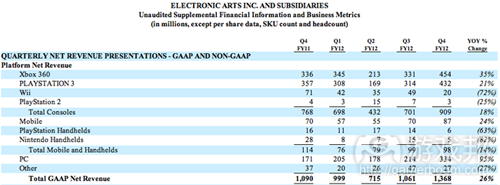
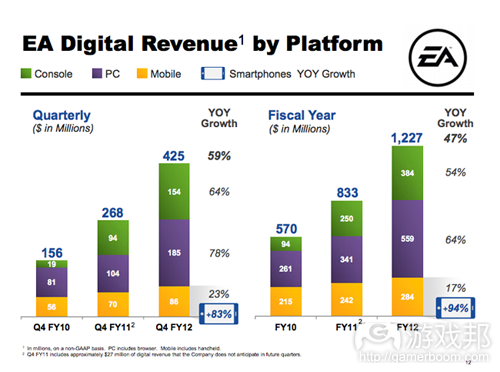

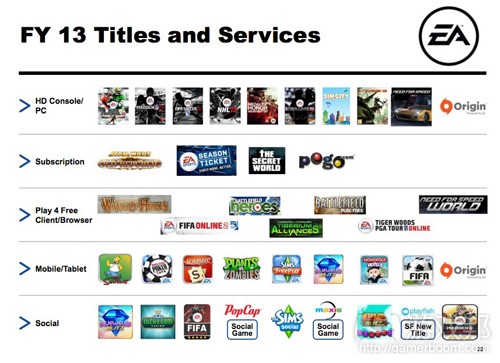
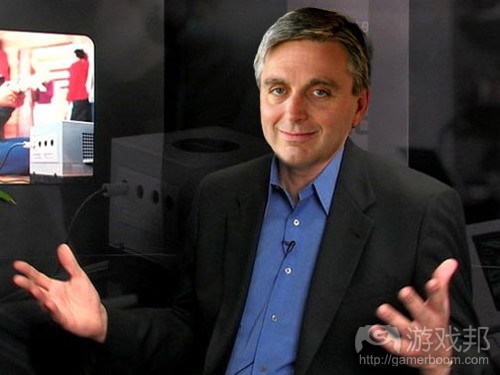
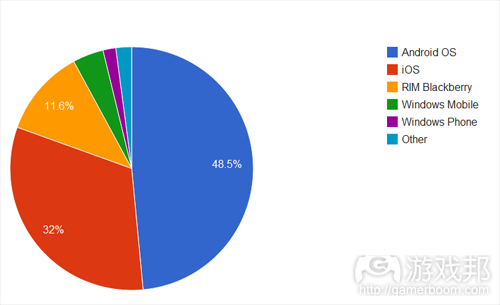















 闽公网安备35020302001549号
闽公网安备35020302001549号